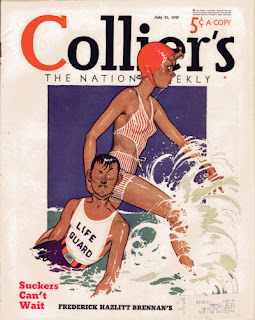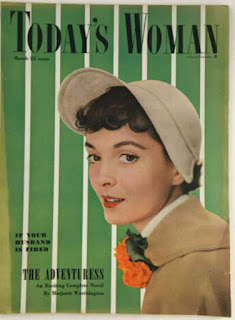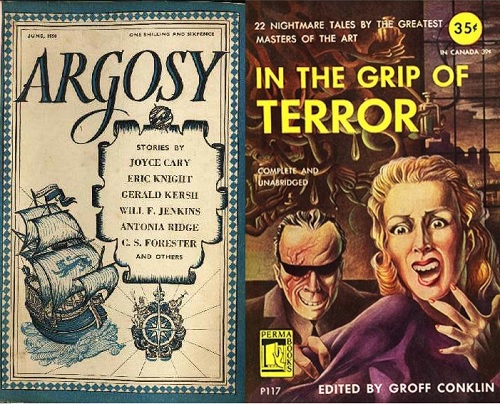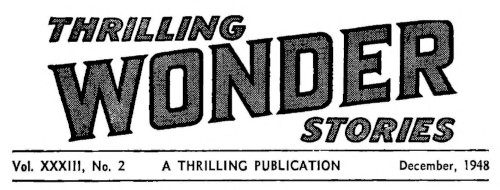Thrilling Wonder Stories was published under that title from 1936 to 1955; in our last episode we looked at an issue from the first year of that run, the December '36 issue. Today we fast forward twelve years to the December 1948 issue to read stories by Murray Leinster, Frank Belknap Long and Charles L. Harness. This issue is packed full of stories by people we are interested in here at MPorcius Fiction Log, and in our next episode we'll read the stories by Ray Bradbury, George O. Smith and L. Ron Hubbard included in its pages. There's also a tale by Frederic Brown in here, "Knock," which we've already read--
I blogged about it in 2018--and one by John D. MacDonald, "A Child is Crying," that
we covered in the blog's early days in 2014.
The fiction in this issue is very attractive, but--wow!--look at that cover. Irresistible, eh, wot? Who could see such a thing on the newsstand and pass it by? Looking beyond Earle Bergey's hypnotic cover, on the inside pages we find many interior illustrations by Virgil Finlay, including one of a bazooka team in space suits which is pretty awesome, so this issue is truly a feast for the eyes.
In the letters column, we see a missive from Lin Carter weighing in on the August issue. He attacks the cover (which I have to agree is below average) and praises Henry Kuttner's "Happy Ending." (I blogged about "Happy Ending," which isfdb suggests was co-written with Kuttner's wife C. L. Moore, back in 2019.) That August '48 issue also has stories by Ray Bradbury, Theodore Sturgeon, and Murray Leinster, so I will probably be checking it out some day, lifespan permitting.
"The Ghost Planet" by Murray Leinster
The background to "The Ghost Planet" is kind of a downer. Earth is suffering overpopulation which is putting pressure on the food supply and enduring an economic depression that the world government and the monopolistic Guilds are incompetent to relieve. Mankind has reached out to the inner planets and the moons of the gas giants, but found no place worth colonizing, and space exploratory expeditions are plagued by psychological problems!
Our hero, Tom Drake, is the youngest member of the expedition to Titan, and the most level-headed, and he and a real mental case are dispatched from the Titan expedition in the emergency craft to return to Earth to get the reading material and television recordings that will, hopefully, solve the morale problem on Titan. His companion goes so bonkers he has to be sedated, so Tom is left in sole charge of the little space vessel and so he is the only person to see that strange spherical mist out by Mars, a mist which seems to move under its own power and to be trying to intercept Tom's ship!
The mist, which has the shape of a sphere a thousand feet across, envelops the little ship, and Tom feels like he is being watched. Then the mist leaves. When Tom tells his colleague and then peeps on Earth about the mist they think he is mentally ill and he loses his job!
Months later a similar mist sphere drifts down to Earth and the entire world sees it on TV. Tom's friend Lan Hardy is affianced (these old SF stories are full of engaged couples) to Kit McGuire, the daughter of former World President McGuire, and so Tom has a chance to compare notes with Prez. McGuire (who naturally has many connections and sources, and had a real job as an engineer before going into the filthy business of politics) and they realize that the thousand-foot spheres of mist are scouts sent by a huge globe of mist out there that they dub "the ghost planet." Tom theorizes that the ghost planet is from another universe that intersects with our universe on only one dimension, like a cork floating on the surface of water. The sphere scouts and ghost planet have no apparent mass or gravity and don't show up on radar because they are mostly in that other universe and only peeking into ours. The people of the ghost planet have obviously solved the problem of interstellar travel, and Tom and Prez. McGuire roll up their sleeves and burn the midnight oil in McGuire's lab, seeking a way to communicate with the aliens so that we too can travel among the stars and discover planets which we can colonize and ease all that population pressure.
The scout spheres start kidnapping individuals, turning them into mist and then flying off with them. A sphere that turns a man into mist itself becomes slightly less misty and more "real." (Tom and McGuire give a lot of science lectures about these phenomena.) Tom and the Prez figure out how to resist these raids and how to negotiate with the aliens without any help from the government, who are portrayed as a bunch of jerks who are going to escalate the situation into an all-out planet destroying war. Lan is little better, taking credit for Tom and McGuire's discoveries and inventions and getting a sweet appointment with the tyrannical government as leader of the defense. The world government seizes all private space craft to build a space fleet to attack the ghost planet, but Tom and McGuire, accompanied by Kit who has called off her engagement to Lan, avert a cataclysmic war by striking a deal with the ghost people, who only kidnapped those people to study them in search of a cure for cancer. The Earth conquered cancer decades ago, and we trade that medical info for the aliens' interstellar drive so all our problems are solved. Kit and Tom decide to get married and we are assured that in a few months the happy couple will be exploring the galaxy and finding new worlds on which to settle and build a better civilization.
This is a pretty good short novel, and there are a lot of little facets to it besides its fun depictions of space travel and engineers saving Earth from a devastating war and opening up the galaxy to colonization. Leinster offers readers a satire of politics and of such phenomena of mass culture as televised sports, the news media and TV, and a depiction of an overpopulated world. There are also little jokes, like how Lan is more interested in making out with Kit than helping McGuire and Tom work in the lab, and how the first man captured by the aliens is an absurd fat guy who runs an artificial flower factory and is seized by the Lincoln Monument in Cleveland, which Leinster tells us, more than once, is ugly.
(Feminists may object to the character of Kit McGuire, who comes off as flighty, fickle and suggestible, a woman who needs the guidance of a strong man, and whose role in the plot seems to be to serve as a barometer of how admirable other characters are and as a reward for Tom's demonstrations of ability and moral strength.)
Thumbs up for "The Ghost Planet." My endorsement is perhaps a rare one, as it seems this story has never been reprinted.
"Fuzzy Head" by Frank Belknap Long
"Fuzzy Head" is a sad story about parenthood, and an example of Long going poetical on us with lots of similes and metaphors; it is also a "meta" story in which one of the characters is a reader of SF magazines and comments on how his life resembles the plot of so many science fiction stories.
Long tells the story out of order in flashbacks, sometimes in the first person, sometimes in the second person, but I’ll just summarize the plot in linear fashion.
Stephen Ambler was on the crew of a U. S. Navy aircraft observing an atomic explosion at Bikini Atoll. Soon after he got married and his wife Helen gave birth to their son a year later. Little Johnny is somewhat odd, exceptionally intelligent and living in a fantasy world in which he is himself immortal and in which his doll, which looks like an old man and has been named by him Fuzzy Head, is alive. At age 8 the boy starts calling out to the stars at night, saying he is sick of living on Earth and begging someone to come collect him, and Mom gets pretty upset. Dad, trying to lighten the mood, tells his wife that because he was irradiated at Bikini their son is a super mutant like in all the science fiction stories he has read. Mom is not comforted by Stephen's comedy stylings.
We realize the extent of Johnny’s superpowers when we witness him playing with Fuzzy Head; the kid can turn Fuzzy Head inside out with his mind and his working of his powers on the doll have imbued its wood and metal with some of his own life force, so that Johnny thinks of himself as Fuzzy Head’s father. When a mated couple of extra dimensional superhumans come in response to Johnny's cries to adopt the supertyke, the kid is at first thrilled, but when his new parents tell him he has to leave Fuzzy Head behind along with all other mundane human things—including his material body!—Johnny refuses to go without his "son." The superwoman is pretty upset (in this story women are more emotional than men, something I guess we are today supposed to pretend we don’t believe) because she is desperate to have a child (in this story women really want to have children and don't just see them as obstacles to career and social life) but the superman, a level-headed and logical superguy, realizes that Johnny still hasn’t shed his cocoon of homo sapiens humanity, and has to stay in the mundane material world for a few more years before he can join his adoptive homo superior superparents.
The end of the story is a suspense sequence, as father Stephen resolves to throw Fuzzy Head in the furnace because he fears Johnny may be developing a sort of complex (this story also has a psychology angle.) Will Johnny's father go through with what amounts to the murder of his grandson?
I found "Fuzzy Head" absorbing, a story much better than Long’s average. I was legitimately curious to find out what was going to happen, and didn't know whether Johnny was going to leave our material world or remain in it or whether Dad was going to burn up Fuzzy Head or not. "Fuzzy Head"'s style and themes made me feel like Long was trying to emulate Ray Bradbury, what with how he was waxing poetic and trying to get into the headspace of a precocious child, understand a kids' view of the world and its relation to fantasy, and depict adults' perhaps misguided beliefs about child psychology.
Modern, functional dolls are fearfully and wonderfully made, but old-fashioned dolls speak the language of childhood, of dark unexplored attics, hidden jam pots, and calico-draped dressmaking dummies as slim as mother used to be.
Some children prefer them.
I also thought it clever and literary of Long to portray three families, all in tragic crisis, all with Johnny at their centers—Johnny the human and his biological parents, Johnny the super human and his adoptive alien parents, and Johnny the father of a golem or homunculus or whatever we want to call Fuzzy Head.
Thumbs up! In his letters, H. P. Lovecraft often credits Long with great erudition and sensitivity and poetic ability, something I can't say I have seen reflected in much of Long's fiction, but we get a glimpse of those qualities and some literary ambition here, and after panning so many of Long's productions, it was sort of thrilling to come upon something of his I can recommend without reservation.
"Fuzzy Head" would be reprinted in the 1948 Long collection
The Rim of the Unknown, which our Italian friends reprinted in 1995. (We've already read some other stories that appear in
Rim of the Unknown, including
stories about giant arthropods preying on people and one about
a surprise invasion from another dimension.)
"Fruits of the Agathon" by Charles L. Harness
This is the story which inspired the cover that won my heart. I've never actually read anything by Charles L. Harness before, but his name appears on the cover of this issue of
TWS above those of Ray Bradbury, Fredric Brown and L. Ron Hubbard, so I guess he was a big draw and I should maybe know more about him.
[UPDATE Oct 21, 2022: Commenter Lastyear throws some cold water on my "big draw" theory in the comments below; maybe Harness's name is on top because of typographical reasons, i. e., it is longer than the others' names?] Jacques Sadoul included "Fruits of the Agathon" in his 1978 anthology
Les meilleurs récits de Thrilling Wonder Stories so he must have thought this was an above average piece of work, and perhaps representative of what
Thrilling Wonder was all about, so maybe it makes sense for me to make my first acquaintance with Harness here.
It is the future--the late 1970s! One of the most powerful institutions in the world is the Lodge of Freudians, a priesthood of celibate robed psychoanalysts who never sleep--their fatigue is relieved by daily blood transfusions so these jokers can spend 24 hours a day hard at work maintaining peoples' sanity. When one becomes a Freudian, one abandons all ties to friends and family and has plastic surgery to make his face look like that of all other Freudians. But today Freudian Toring has been called upon by the Lodge leadership to interact with his father, Dr. Follansbee!
A bizarre concatenation of events has lead the Lodge to make this request of Toring. The Lodge has finally perfected the "biostat," a machine that can predict--to the very minute!--your death once it is within three days. Coincidentally, Dr. Follansbee--the genius who came up with the blood rejuvenation technique that means Freudians never need sleep--has almost completed development of his technique to telepathically contact other minds across time; if his method proves workable, adepts will be able to communicate with anybody in the past and future, even their older or younger selves! This will be a boon to the Freudians, allowing them to cure people of neuroses much more efficiently! But the biostat indicates that Dr. Follansbee is about to keel over! So, the Lodge wants Toring to use his own mind powers, his natural connection to and affinity with his father, and special equipment provided by the Lodge, to inspect and record the operation of Follansbee's mind as the genius performs a feat of cross-time telepathy so his technique will be preserved.
This story is dense and complicated, with lots of characters and lots of science fiction concepts. Toring's brother Pickerel Follansbee hates their father and wants to kill him and Pickerel's wife Maillon is a famous composer and is dying of a mysterious cancer, which Toring's other brother, Blaine, is trying to cure; the source of Maillon's cancer and Dr. Follansbee's knowledge that he is going to be murdered by one of his own sons are the basis of two of the three or four murder mysteries presented by Harness to readers of "The Fruit of Agathon." Maillon's father is a top chemist and a billionaire businessman; Maillon's sister Naida is suffering severe psychological trauma and the chemist is trying to get her priority treatment from the Lodge, which has a four-month waiting list for patients. All this is mixed up with the Lodge's new covert policy, the "agathon" policy; as an epigraph explains to us, "agathon" means "good-death" and the Freudian Lodge's new policy is to secretly murder people whom the biostat tells them are about to die so that their inevitable deaths will provide some benefit to humanity. Oh, yeah, over the course of the 16-page story the cast collaborates on the invention of artificial eyes and engages in a struggle over management of a major corporation and still has time for a love triangle. Whew!
The complicated plot comes to a finale when Toring achieves immortality of a sort by using the technique learned form his now-dead father to imprint his consciousness atop the consciousness of Naida and then commit suicide. Nobody realizes he has done anything more than cure Naida's mental illness, so Follansbee's special methods remain Toring/Naida's monopoly for the time being. Because Toring is still "alive" even though his body is dead, the biostat still registers him as alive, so the Lodge thinks the biostat is faulty and so ceases all use of biostats and suspends the agathon policy indefinitely.
I just told you that Frank Belknap Long's "Fuzzy Head" reminded me of Ray Bradbury, and Harness's "Fruits of the Agathon" reminds me of the work of Robert Heinlein, it being an interpersonal drama about the relationships of superior people set in a future world with strange new institutions and types of family relationships. (And the biostat of course reminds us of Heinlein's famous 1939 tale "Life-Line.") I'll also note that the rapid advance of mental powers, the paradigm shifts and the plot twists remind me of A. E. van Vogt.
"Fruits of the Agathon" is a wild and ambitious story full of science lectures, psychic powers, speculation on free will, high technology, and lots of detective and soap opera jazz. The human drama stuff fails to be moving, the characters being flat archetypes, but it is at least interesting, and all the SF stuff works, so I enjoyed "The Fruits of Agathon." Thumbs up!
**********
Wow, three good stories. How often does that happen? Can we hope that the next three stories we read from the December 1948 issue of Thrilling Wonder Stories are equally as successful? Cross your fingers and be here for the next episode of MPorcius Fiction Log to find out!


























